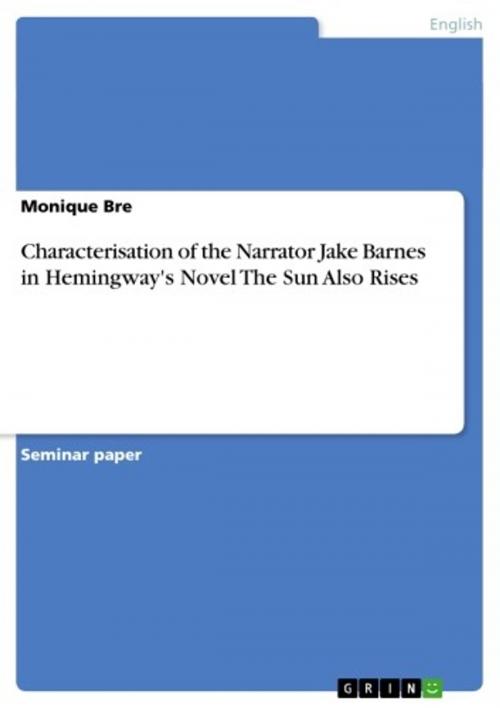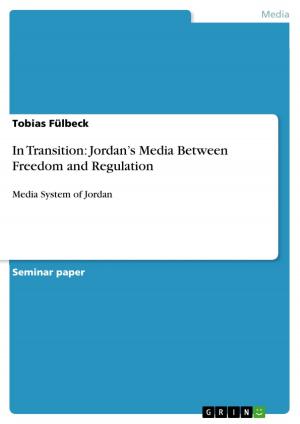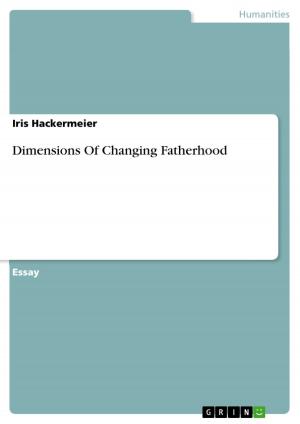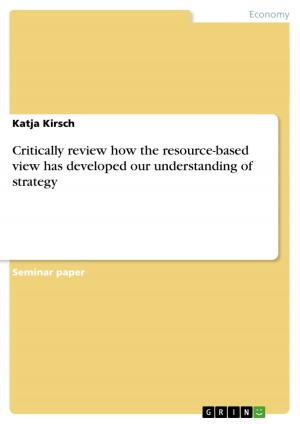Characterisation of the Narrator Jake Barnes in Hemingway's Novel The Sun Also Rises
Nonfiction, Entertainment, Drama, Anthologies| Author: | Monique Bre | ISBN: | 9783638427814 |
| Publisher: | GRIN Publishing | Publication: | October 14, 2005 |
| Imprint: | GRIN Publishing | Language: | English |
| Author: | Monique Bre |
| ISBN: | 9783638427814 |
| Publisher: | GRIN Publishing |
| Publication: | October 14, 2005 |
| Imprint: | GRIN Publishing |
| Language: | English |
Seminar paper from the year 2002 in the subject American Studies - Literature, grade: 2,3, Dresden Technical University (Institut Amerikanistik), course: Images of the American Twenties, 5 entries in the bibliography, language: English, abstract: Ernest Hemingway's novel The Sun Also Rises is set in Europe after World War 1. The effects of the war led to a decline of the traditional value system - to a degeneration of morality, belief in justice, and love. It was a time of despair and disillusionment. People who experienced the war became psychological and morally 'lost'. Because of the dissolute lifestyle of this generation Gertrude Stein called them the 'Lost Generation'. Life became meaningless for these people because they were no longer able to rely on traditional beliefs. They tried to fill up their empty lives with inconsequential activities like drinking, dancing, and debauchery. These characteristics of this time apply to almost all of the characters in the novel. The Sun Also Rises deals with a desperate group of expatriates, who are all in search of passion and meaning of life. Consequently to the war, all characters are in some way, emotionally, psychologically, or spiritually damaged. Their lifestyle is just a purposeless activity of an aimless life which centers on activities like drinking, dancing, eating, fishing, watching bullfights, or getting haircuts. Jake and his companions are always on the move: from one cafe to another, from Paris to Pamplona. But their excessive lifestyle does not make them happy. The permanent use of alcohol lets them forget their situation and lets them not think about their inner lives or about the war. The partying and drinking, which is a form of escapism, is the only possibility to experience distraction. Under the influence of alcohol the characters think they can escape a life that is empty of true affection and purpose.
Seminar paper from the year 2002 in the subject American Studies - Literature, grade: 2,3, Dresden Technical University (Institut Amerikanistik), course: Images of the American Twenties, 5 entries in the bibliography, language: English, abstract: Ernest Hemingway's novel The Sun Also Rises is set in Europe after World War 1. The effects of the war led to a decline of the traditional value system - to a degeneration of morality, belief in justice, and love. It was a time of despair and disillusionment. People who experienced the war became psychological and morally 'lost'. Because of the dissolute lifestyle of this generation Gertrude Stein called them the 'Lost Generation'. Life became meaningless for these people because they were no longer able to rely on traditional beliefs. They tried to fill up their empty lives with inconsequential activities like drinking, dancing, and debauchery. These characteristics of this time apply to almost all of the characters in the novel. The Sun Also Rises deals with a desperate group of expatriates, who are all in search of passion and meaning of life. Consequently to the war, all characters are in some way, emotionally, psychologically, or spiritually damaged. Their lifestyle is just a purposeless activity of an aimless life which centers on activities like drinking, dancing, eating, fishing, watching bullfights, or getting haircuts. Jake and his companions are always on the move: from one cafe to another, from Paris to Pamplona. But their excessive lifestyle does not make them happy. The permanent use of alcohol lets them forget their situation and lets them not think about their inner lives or about the war. The partying and drinking, which is a form of escapism, is the only possibility to experience distraction. Under the influence of alcohol the characters think they can escape a life that is empty of true affection and purpose.















